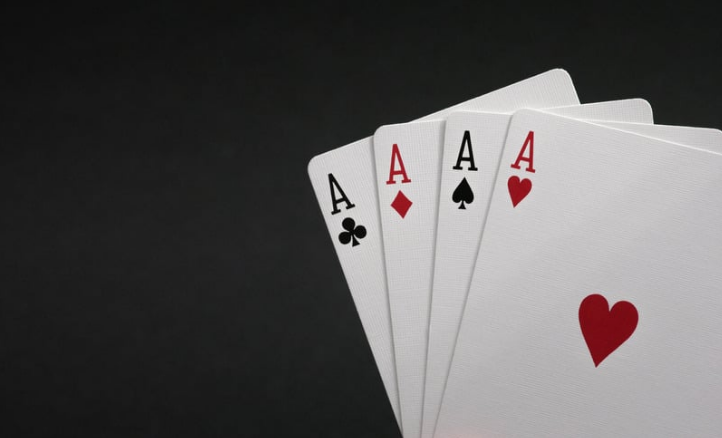The Myth of Mental Illness and the Truth About Mental Health: A Man’s Journey to Freedom

Part 4 Four: Aces Are Great in Poker But Challenging in Life
You can check out Part 1, Part 2, and Part 3 of this series. It never occurred to me that my lifelong anger and depression, and later my two broken marriages, had anything to do with my childhood. All that changed in 1998 when I reached out to a colleague, Dr. Charles Whitfield, because I couldn’t seem to heal my depression even though I was receiving good therapy and was taking medications. He told me that the missing piece in my healing might be addressing childhood trauma.
Dr. Whitfield introduced me to the (ACEs) studies developed by Vincent Felitti, M.D., the head of Kaiser Permanente’s Department of Preventive Medicine in San Diego, and Dr. Robert Anda, a medical epidemiologist at the CDC.
“The information the studies have provided us is not just helpful,”
said Whitfield,
“it is astounding.”
He went on to describe the original studies and what they learned.
“Drs. Felitti and Anda looked at 9,508 middle-class, middle-aged people in Southern California. All were members of Kaiser’s health maintenance organization, who were medically evaluated, and then each completed a sixty-eight-question survey about seven categories of childhood trauma and subsequent illness. The researchers also had the medical records of each patient with which to verify the findings.”
They found that a large percentage of this general medical clinic population reported the following traumatic experiences from their childhoods.
- Physical abuse
- Sexual abuse
- Emotional abuse
- Physical neglect
- Emotional neglect
- Exposure to domestic violence
- Household substance abuse
- Household mental illness
- Parental separation or divorce
- Having an incarcerated household member
Their findings rocked the world of health care. It offered a whole different approach for understanding, treating, and preventing disease—everything from cancer and heart disease to obesity and depression. All these problems, and more, had roots in our childhood experiences of trauma. Childhood wounds provided a psychosocial basis for a whole range of problems that impact brain function, even those that were assumed to be purely physical.
They found the following to be true:
- More than half of respondents reported at least one ACE.
- If you have one ACE, you are highly likely to have two or more ACEs.
- The more ACEs you have as a child, the more likely you are to have a whole range of physical and emotional problems as an adult.
I was surprised to learn that mental, emotional, and relationship problems can be caused by the experiences we may have had as children. I was even more surprised to find that even physical problems such as asthma, diabetes, heart disease, and cancer were also connected to ACEs.
I was anxious to see how I would score and answered the following questions developed by the ACE researchers for the general public:
Prior to your eighteenth birthday:
- Did a parent or other adult in the household often or very often . . . Swear at you, insult you, put you down, or humiliate you? Or act in a way that made you afraid that you might be physically hurt?
No___. If Yes, enter 1 ___.
- Did a parent or other adult in the household often or very often . . . Push, grab, slap, or throw something at you? Or ever hit you so hard that you had marks or were injured?
No___. If Yes, enter 1 ___.
- Did an adult or person at least five years older than you ever . . . Touch or fondle you or have you touch their body in a sexual way? Or attempt or actually have oral, anal, or vaginal intercourse with you?
No___. If Yes, enter 1 ___.
- Did you often or very often feel that . . . No one in your family loved you or thought you were important or special? Or your family didn’t look out for each other, feel close to each other, or support each other?
No___. If Yes, enter 1 ___.
- Did you often or very often feel that . . . You didn’t have enough to eat, had to wear dirty clothes, and had no one to protect you? Or your parents were too drunk or high to take care of you or take you to the doctor if you needed it?
No___. If Yes, enter 1 ___.
- Were your parents ever separated or divorced?
No___. If Yes, enter 1 ___.
- Was your mother or stepmother: Often or very often pushed, grabbed, slapped, or had something thrown at her? Or sometimes, often, or very often kicked, bitten, hit with a fist, or hit with something hard? Or ever repeatedly hit over at least a few minutes or threatened with a gun or knife?
No___. If Yes, enter 1 ___. - Did you live with anyone who was a problem drinker or alcoholic, or who used street drugs?
No___. If Yes, enter 1 ___.
- Was a household member depressed or mentally ill, or did a household member attempt suicide?
No___. If Yes, enter 1 ___.
- Did a household member go to prison?
No___. If Yes, enter 1 ___.
Now add up your “Yes” answers: ____. This is your ACE score.
I found I had four ACEs, which is great if you’re playing poker. However, in the game of life, four ACEs are very risky. The study found the following increased risk factors for those who had four or more ACEs compared to those who had none:
- A four- to twelve-fold increase of health risks for alcoholism, drug abuse, depression, and suicide attempt.
- A two- to four-fold increase in smoking, poor self-rated health, having more than fifty sexual intercourse partners, and sexually transmitted disease.
- A 1.4- to 1.6-fold increase in physical inactivity and severe obesity.
New Understandings from the ACE Studies
Since the first ACE studies were reported in 1998, there have been hundreds of further studies that have validated the basic findings: Adverse Childhood Experiences (ACEs) can cause later physical and emotional problems in adulthood. The latest information about current research on ACEs is available on two websites developed by journalist Jane Ellen Stevens:
www.AcesTooHigh.com and www.AcesConnection.com. Stevens has been a newspaper and magazine journalist focusing on health, science, and technology for more than thirty years and has been reporting on ACE study and related research since 2005.
Subsequent to the original ACE study, other ACE surveys have expanded the types of ACEs, so if you have had any of the following experiences, add another number to your ACE score.
- Did you experience racism?
No___. If Yes, enter 1 ___.
- Did you experience gender discrimination?
No___. If Yes, enter 1 ___.
- Did you witness a sibling being abused?
No___. If Yes, enter 1 ___.
- Did you witness violence outside the home?
No___. If Yes, enter 1 ___.
- Did you witness a father being abused by a mother?
No___. If Yes, enter 1 ___.
- Were you bullied by a peer or adult?
No___. If Yes, enter 1 ___.
- Were you hospitalized, in foster care, or forced to live away from your family?
No___. If Yes, enter 1 ___.
- Did you grow up and live in a war zone?
No___. If Yes, enter 1 ___.
- Did you grow up in an unsafe neighborhood?
No___. If Yes, enter 1 ___.
- Was a family member deported or did you live in fear of deportation?
No___. If Yes, enter 1 ___.
More recent research also indicates that most everyone, even those of us with a significant number of ACEs also have had positive childhood experiences that can balance the negative ones and that positive experiences throughout our lives can improve our physical mental, emotional, and relational health.
ACEs have been invisible to most of us, since they happened a long time ago. Even when we were aware of the effects of past abuse, neglect, or abandonment, we often don’t realize how much the past still influences our present. Only by understanding our life history can we heal old wounds we didn’t even know we had.
How ACEs Early in Life Can Lead to Problems Later in Life
It took me many years to really understand how events in childhood, even relatively common ones such as having parents who divorced or had mental health problems, could lead to an increased risk for adult depression or broken marriages.
The doctors who designed the initial research had some tentative ideas. Now these ideas have been tested and accepted. They are posted on the Centers for Disease Control and Prevention website. The mechanism for our childhood traumas leading to later problems as adults goes like this:
Adverse Childhood Experiences (ACEs) lead to faulty neurodevelopment, which leads to social, emotional, and cognitive impairment, which leads to adoption of risky health behaviors, which leads to disease, disability, and social problems, which lead to a shortened life and early death.
This has helped me understand how ACEs contributed to the problems I experienced as a child and also later in life. As noted earlier, I experienced 4 ACEs growing up. I came to understand that the effect of these early traumatic experiences had caused a disruption in how my brain functioned. As a child, I felt different. With my father locked up in a mental hospital and my mother terrified that I would end up like my father, I went on with my life, but I always felt afraid. I worried constantly about whether I would end up like my father. Would I be locked up? Would I feel so depressed I would want to die?
I learned that ACEs can not only undermine our physical and emotional health and well-being but can undermine our relationships. Understanding ACEs can go a long way toward helping us understand why men live sicker and die sooner than women.
I will continue the story in Part 5. If you’d like to hear more about men’s mental health and other important issues, I invite you to join our online-community and subscribe to our weekly newsletter. It is free and you can easily unsubscribe if you ever find it no longer meets your needs.







